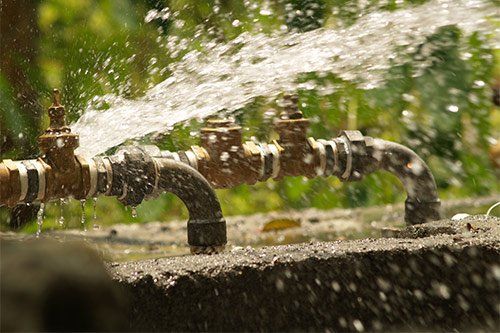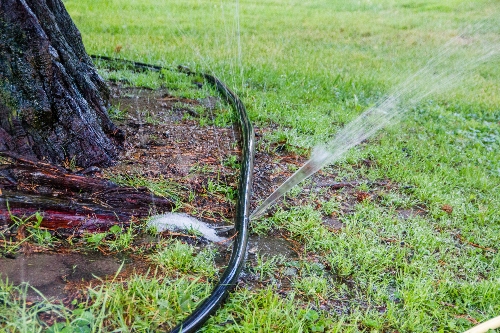The Top 5 Persistent Water Leak Causes
The Top 5 Persistent Water Leak Causes
Blog Article
In this article below you can locate more helpful tips pertaining to How to Find and Prevent Water Leaks in Your Home.

"Be careful of little expenses. A little leak will certainly sink a wonderful ship." - Benjamin Franklin.
He could not have been more ideal due to the fact that water leaks in our residences lead to a waste of resources, enhancing our water expenses. Although this boost could appear minimal in the beginning, it can bring about significant expenses that can damage your financial institution. Other than an increase in costs, water leaks likewise trigger unwanted organic growth, architectural damages, and also even electrical dangers.
Finding out if you have a water leak isn't always simple because of being unable to see most of the pipework in your home. However, If you have had an increase in your water expenses recently, observed water stains on wall surfaces and ceilings, smelt poor smell, and so on. You could want to consider asking for plumbing solutions to get it looked into.
There are a number of root causes of water leakages, and we have assembled the common reasons below. Inspect to see if you have had associated concerns in your house just recently.
Compromised pipeline joints
Pipe joints are the parts of our plumbing system where the pipes link. They are the weakest point of our plumbing system. As a result, they are extra susceptible to degeneration. It is necessary to note that although pipes are created to hold up against stress and last for some time, they weren't developed to last for life; for that reason, they would certainly wear away over time. This wear and tear could bring about fractures in plumbing systems. A common sign of harmed pipeline joints is too much noise from faucets.
High water stress
You observed your house water pressure is more than common yet after that, why should you care? It's out of your control.
It would be best if you cared because your typical water pressure should be 60 Psi (per square inch) and also although your house's plumbing system is made to hold up against 80 Psi. A boost in water pressure can put a strain on your residence pipelines as well as lead to fractures, or even worse, ruptured pipelines. Get in touch with a specialist regarding controling it if you ever observe that your home water stress is greater than typical.
Corrosion
As your pipework grows older, it gets weaker and also a lot more at risk to corrosion after the regular passage of water with them, which can gnaw at pipelines and cause fractures. A visible sign of corrosion in your house plumbing system is discoloration and although this may be hard to discover due to most pipes hidden away. Once they are old to ensure an audio plumbing system, we advise doing a constant examination every couple of years as well as transform pipes
Blocked drains pipes
Food fragments, dust, as well as oil can trigger clogged drains as well as block the passage of water in and out of your sink. If undealt with, increased pressure within the seamless gutters can end and create an overflow up fracturing or bursting pipes. To prevent blocked drains pipes in your house, we encourage you to avoid putting bits down the tubes and also routine cleaning of sinks.
Busted seals
One more cause of water leakages in homes is broken seals of home appliances that use water, e.g., a dishwasher. When such devices are set up, seals are installed around water connectors for very easy flow of water with the equipment. A broken seal can cause leak of water when in usage.
With little or no understanding of plumbing, recognizing your residence's plumbing system sufficient to fix a few of these concerns (without repercussion) can be a problem. Connect with plumbing professionals in Pittsburgh, Providence, Rochester, as well as environ today, as well as they'll make those issues go away.
He could not have actually been a lot more best since water leaks in our homes result in a waste of resources, raising our water bills. If you have had an increase in your water bills lately, noticed water stains on walls and ceilings, smelt lousy odor, and so on. A rise in water pressure can place a pressure on your home pipelines and lead to splits, or even worse, burst pipelines. An additional cause of water leaks in homes is damaged seals of residence devices that utilize water, e.g., a dishwashing machine. When such home appliances are set up, seals are installed around water adapters for very easy passage of water with the machine.
5 TIPS IN DETECTING A WATER LEAK IN YOUR HOUSE
Water leaks can be hard to find in your home, yet they can be so common. We rely on water every day in our home, which is why a leak can cause big problems. By detecting them early, you can save money and further damage, getting the problem fixed as soon as possible. Here are 5 tips to help you detect a water leak in your home, so you can contact a plumber straight away and get the issue sorted.
Check your water meter
Many people underestimate the value of the water meter in their home. It can be one of the best ways to tell if you have a leak early on, so you can get on top of it before issues start arising. Start by turning off all the water in your home: taps, washing machine, dishwasher, etc. Now take a look at the meter – if it’s still changing with everything turned off, it’s likely you have a fast-flowing leak that you need to get on top of straight away. If nothing changes, then leave your meter for an hour or two and come back to it. Did it change in this time? It’s likely you have a slower leak, which isn’t as urgent but still handy to get fixed so it doesn’t become a bigger problem.
Keep an eye on your bill
Another good way to detect a leak in your home is by keeping an eye on your water bill. It helps if you have a past bill from the same period of time. You can compare like for like and determine whether your water usage has increased significantly. If it has, there may be a leak in your system that you haven’t picked up before. A professional plumber can check through all of your pipes and determine where it is coming from.
Look for damage
If you have a leak inside your home, you will notice damage over time. Take a look at your showers and bathtubs and note whether any of the tiles surrounding the area seem to be discoloured or damaged in any way. There may be water stains, mould or peeling material that has resulted from a build up of moisture over time. Make sure you take a look under sinks at the back of cupboards that don’t get accessed regularly. This is where damage can go unnoticed and build up over periods of time.

As a passionate person who reads on Where to Find Water Leaks, I was thinking sharing that article was important. Remember to take the time to promote this blog entry if you enjoyed reading it. Thanks for going through it.
One-stop solution, phone now! Report this page